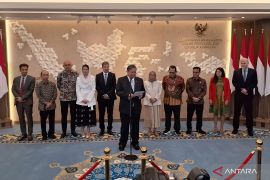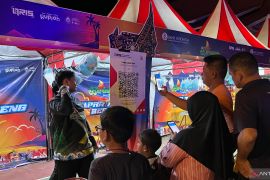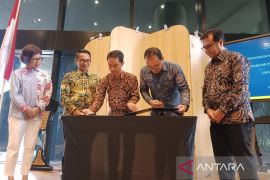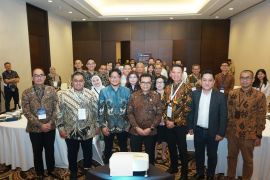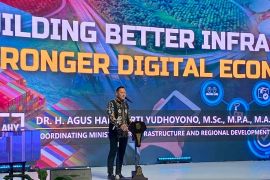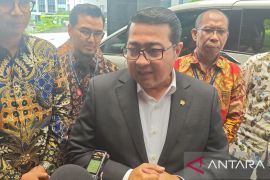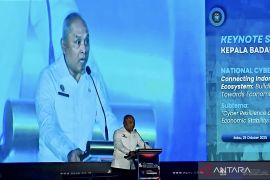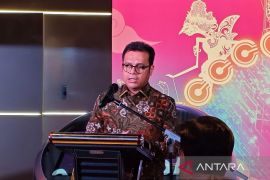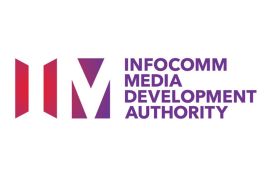The Internet has made things easier for businesses in terms of product marketing, transactions, and making deliveries to buyers.
The continued development of a digital ecosystem would eventually help step up business growth and the convenience it offers.
However, according to the Ministry of Communication and Informatics, the digital economy's contribution to Indonesia's gross domestic product (GDP) has reached just 4.6 percent. In comparison, in Europe, the United States, and China, it is pegged at 40–50 percent.
The Indonesian government has predicted that in six years, the nation will experience a demographic dividend, where its population will be dominated by people of working age (15–64 years).
This certainly provides a market opportunity for business players to boost sales. For those involved in the digital economy, this is an opportunity that must not be wasted.
This consideration is what led the Jakarta provincial government to intensively train its residents recently on becoming entrepreneurs by utilizing digital infrastructure. The reason: to ensure no resident or MSME player is left behind in seizing this opportunity.
To tap future market opportunities, there are several things that need to be considered, especially those related to consumer behavior in the digital era.
In the digital era, consumers are getting smarter about obtaining the products they want, making it a challenge for digital economy players to meet market demand.
The population and the approaching peak of the demographic dividend, of course, will need to be utilized properly to spur economic growth.
Its large household consumption makes Indonesia, with its population of 278 million, a potential market target. Consumer empowerment in Indonesia is a priority because it is an important asset for economic growth in the trade sector.
Smart and empowered consumers would be more capable of developing their own economy and the country's economy.
Empowered consumers always seek clarity regarding the products and services they purchase. They understand and protect their rights during the transaction, especially in the digital era when direct physical interaction is minimal.
According to deputy chairperson of the Indonesian E-commerce Association (idEA), Budi Primawan, the creation of empowered consumers in the digital era is the responsibility of many parties.
The convenience offered by the digital era must be utilized by consumers to get all the information they need before making a transaction.
In this way, consumers can understand their rights and obligations during transactions, including the right to get products that suit their needs as well as ensure the security of transactions to avoid the threat of cybercrime.
To develop the economy, the government can no longer focus solely on developing business players. In numbers, consumers also make a big contribution. Strong purchasing power, good understanding of making safe transactions, and equal distribution of empowered consumers also need to be considered so that the economies of all regions in the country can grow in tandem.
Empowering consumers
According to director of consumer empowerment at the Directorate General of Consumer Protection and Orderly Commerce of the Ministry of Trade, Chandrini Mestika Dewi, improving the literacy of digital consumers is a form of consumer empowerment.
It is necessary to make the Indonesian market healthier and more stable in positive conditions.
To this end, education and dissemination of information are needed to respond to the change in the pattern of trade activities, which are currently digital-based. The development of the digital economy also has a direct impact on the change in consumer and business players' behaviors.
This potential can be tapped by building good cooperation between consumers, business players, and the government to realize increasingly empowered consumers.
Empowered consumers would create market demand that is in line with the growth of superior local products, which would, in time, bolster the national economy.
Empowerment is a new term. Earlier, the public was more familiar with the term "consumer protection." Here empowerment signifies that both consumers and business actors try to ensure that a transaction runs smoothly.
A deputy at one of Indonesia's leading e-commerce companies, Farid Suhardjo, said that for the digital market in Indonesia to evolve, there are many challenges that will need to be faced.
He noted that Indonesian consumers are still relatively new to many digital economic activities so they still need time and good literacy on how to use digital technology properly and correctly.
Still, the presence of e-commerce platforms, with all their features and services, is providing many conveniences to consumers.
In digital transactions, consumers go through many stages, such as searching for the product they want, reading the product description, comparing prices, reading other buyers' reviews, deciding to buy, and making payments.
He underscored that consumers must truly understand the entire process so that the transaction can run smoothly.
The features offered by e-commerce platforms are also designed not only to make it easier to carry out transactions, but also provide comfort and peace of mind to consumers.
For example, there is a return feature that consumers can use easily if the goods received do not match what they ordered, along with a quick refund. Therefore, consumers do not need to worry.
Indonesian consumers need to continue to learn and adapt to the developments in the digital era to ensure they only experience their positive impacts and to create a safe and comfortable digital economic ecosystem.
Consumers' level of awareness regarding their rights in a digital economic activity highly determines the quality of a transaction.
Head of the Communication and Education Commission of the National Consumer Protection Agency (BPKN), Heru Sutadi, said that education and dissemination of information to consumers to encourage them to become empowered are equally important for improving service quality, digital capabilities, and the fulfillment of consumer rights by business players in the e-commerce ecosystem.
In 2024, the government is targeting to raise the Consumer Empowerment Index from 57.04 or the Capable stage to the Critical (minimum score of 60) stage.
To welcome the achievement of the Golden Indonesia vision, it is hoped that Indonesia's Consumer Empowerment Index will cross 80, which means that consumers in the country will also be increasingly empowered.
Innovation, collaboration, and education are the keywords for a digital economy to develop, business players to make a profit, and consumers' rights to be protected and fulfilled.
With e-commerce, anyone can become a seller of products or services, and thereby become a driver of the economy.
With the new sales process that continues to develop with the adoption of new technologies, business players, resellers, platforms, and consumers are facing new challenges.
Therefore, to ensure businesses can develop and consumer confidence can be maintained and even, be increased, all stakeholders must work together so that e-commerce can provide the maximum benefits to all.
Related news: Govt asks women to continue to participate in digital era
Related news: Exploring convenience offered by digitized financial services
Editor: Rahmad Nasution
Copyright © ANTARA 2024



